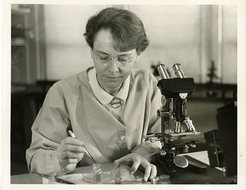Barbara McClintock Seminar Series
Barbara McClintock

"If you know you are on the right track, if you have this inner knowledge, then nobody can turn you off .. no matter what they say."
In 120 years, less than 3 percent of Nobel Prize winners in science were female. Barbara McClintock was one of them. She was the 3rd woman receiving an unshared Nobel Prize “for her discoveries of mobile genetic elements”.
Barbara McClintock (1902 – 1992) was an American cytogeneticist who devoted her life to science.
A pioneer in the field of genetics in maize (corn) cells, she discovered that genes can change position between and within chromosomes (genetic transposition or “jumping genes”).
For many years her findings were largely ignored by other scientists as they were just too far beyond the understanding and conventional thinking of genetics during that time.
“They thought I was crazy, absolutely mad.”
McClintock believed in her research and the evidence she found under her microscope. Improved molecular techniques finally confirmed her theory in early 1980s, changing the concept of what genes are capable of and leading to the Nobel Prize in Physiology or Medicine in 1983 – more than 30 years after her first discovery.
McClintock was born in Connecticut, USA in 1902 and grew up in New York. Her mother was not in favor of her desire to go to College and believed that this would harm her chances to get married.
Nevertheless, McClintock enrolled at College and studied Agriculture at Cornell University where she also completed her PhD. McClintock’s professional career mirrors the development of the acceptance of female scientists during the last century.
McClintock absolutely loved working in the lab, listening what nature had to tell.
“I was just so interested in what I was doing I could hardly wait to get up in the morning and get at it.”
After working many years in California, Missouri as well as Germany, she finally settled in Cold Spring Harbor in New York.
McClintock learned of her success in winning the Nobel Prize in Medicine and Physiology over the radio. She did not own a telephone.
Barbara McClintock dedicated her life to the work she was so passionate about, despite all obstacles women were facing during that time in developing a career in academia.
In the early 20th century academic education and careers for women just started to develop. The acceptance by their male colleagues was critical even though many women made significant contributions to science during that time.
As a pioneer in genetics her findings on the phenomenon of genetic transposition are fundamentally important for the understanding of modern genetics until today.
